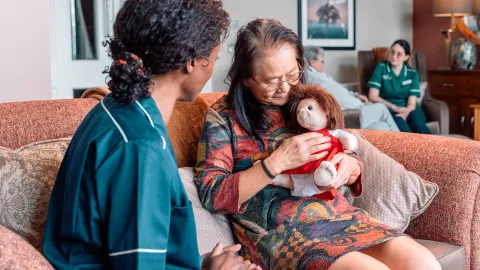
How do robotic pets for dementia work?
With dementia rates on the rise in the UK, caregivers are looking for ways to offer an extra layer of comfort and care for their loved ones or patients. An increasingly popular remedy is providing pet therapy through robotic pets, which has proven to have significant emotional and physiological benefits in people with dementia. Due to a cognitive decline in those living with dementia, typically, they’ll struggle to keep up with the demands of owning traditional pets, making robotic pets for dementia patients a great low-maintenance alternative. Whilst not entirely a substitute, their overlapping features can leave similar lasting positive effects on people with dementia.
What are robotic pets?
Robotic pets are artificial pets developed to look, feel, and touch like popular real-life pets, like cats and dogs. Granted, they sound like they’re for children, but more so for the elderly or people with dementia who want the benefits of pet companionship without the actual responsibilities and unpredictability of owning a real-life animal.
How do robotic pets combat loneliness among older adults?
As robot pets for the elderly are designed to mimic the behaviours of traditional pets, people can still reap the many benefits pets offer, such as companionship and emotional connection. Studies show that robot pets for the elderly provide comfort and alleviate loneliness in older adults who live alone, have fewer social connections, or lead less active lives. They offer a sense of presence because of their replicating behaviours. For example, if you speak to a dementia robotic cat, you’ll receive a meowing response just like a traditional cat.
The benefits of robotic pets for people with dementia
They provide emotional support and companionship
Robotic pets are programmed to behave in predictable and non-judgemental ways, making people with dementia feel safe during moments of overwhelm. Because of their consistent and predictable behaviour, people living with dementia can receive emotional support and unconditional companionship when needed.
Reduce stress and anxiety for people with dementia
For people living with dementia, interacting with a robotic pet can evoke feelings of calmness and reduce anxiety. Even a gentle stroke from a robotic pet can increase endorphins, which helps to reduce stress and contributes to positive well-being. Illustrating the emotional and sensory needs of somebody living with dementia can be met through the use of robotic pets.
They are convenient with low maintenance
Unlike traditional pets, robotic pets do not need maintenance such as grooming, bathing, and regular feeding, making them ideal pet companions. People living with dementia may find it challenging to keep up with the demands of caring for traditional pets because of the symptoms they typically face, such as memory loss or confusion. Robotic pets for people living with dementia can still offer remarkable benefits of companionship or support even when robotic pets are not maintained.
How to choose the best robot companion
Start by evaluating what's important to you. What are your preferences and needs? Some robotic pets offer varying features that will better suit someone else's, so keep this in mind when looking at a range of robotic pets for dementia patients so you can compare. For example, would you prefer a dementia robotic cat over a dementia robotic dog? Or a pet with high sensory features? This may mean you would want to opt for a robotic cat that has fluffy features or has the capability to make specific sounds to provide comfort.
Where to find robotic pets for dementia care
There are many places where you can find robotic animals for people living with dementia or Alzheimer’s. Many health centres offer pet therapy, as well as care homes, or online shops such as Alzheimer's Shop.
We make sure each and every resident’s life is enriched through our life-enrichment programmes, where we offer pet therapy to our residents whenever they wish.


